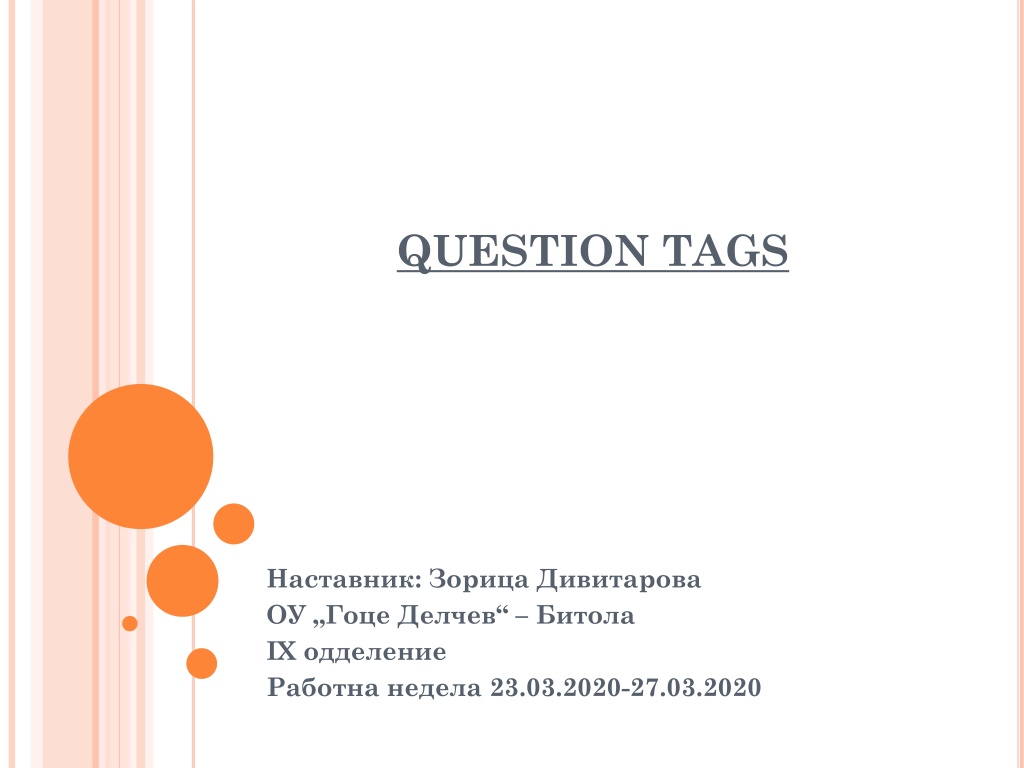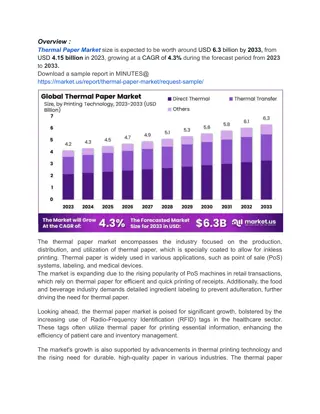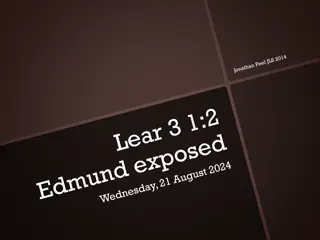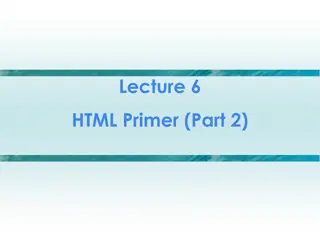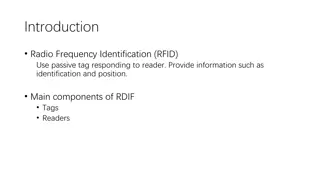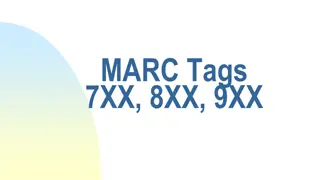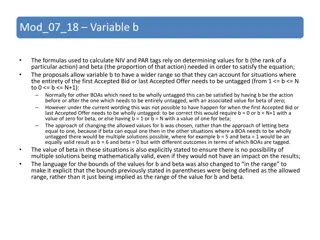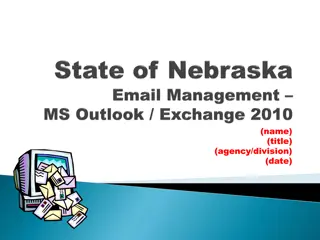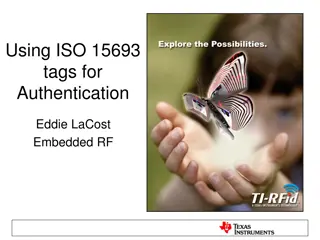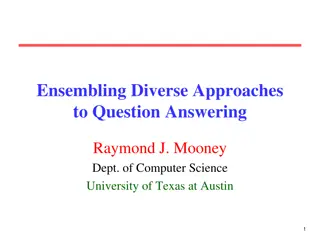Understanding Question Tags in English Communication
Question tags are short questions that follow sentences, commonly used in spoken English to confirm information or seek agreement. Learn when and how to use question tags with clear examples and formation rules for different sentence structures.
Download Presentation

Please find below an Image/Link to download the presentation.
The content on the website is provided AS IS for your information and personal use only. It may not be sold, licensed, or shared on other websites without obtaining consent from the author. Download presentation by click this link. If you encounter any issues during the download, it is possible that the publisher has removed the file from their server.
E N D
Presentation Transcript
QUESTION TAGS : IX 23.03.2020-27.03.2020
: 3-9 . ( 10-13) . . www.ego4u.com www.agendaweb.org divitarovazorica@gmail.com
WHAT ARE QUESTION TAGS? Question tags are short questions that can follow sentences, especially in spoken English. We use question tags to ask if something is true or to ask people to agree with us.
WHEN DO WE USE THEM? We use a question tag to ask if something is true, or to ask people to agree with us, or just to keep the conversation going.
HOW ARE THEY FORMED? Positive statement question tag negative + - Positive statement negative tag? Snow is white, isn t it? Negative statement question tag positive - + Negative statement, positive tag? You don't like me, do you?
FORMATION RULES AND EXAMPLES: With the verb to be You are a teacher, aren t you? She is beautiful, isn t she? *PLEASE NOTICE THAT the form with I am is aren t I I m late, aren t I? I m not late, am I?
With the verb to have You have got a dog, haven t you? He hasn t lost his key, has he? With other verbs (do, don t, did, didn t etc.) They don t play football, do they? They didn t go to the cinema yesterday, did they?
With modal verbs They can drive, can t they? You won t lie to me, will you? Use the same auxiliary ( ) or modal verb as it is in the main sentence. We ll go out together, won t we? Albert can t play the violin, can he? Exception: Let s is followed by shall we Let s go for a walk, shall we?
If the main sentence has no auxiliary ( ), use do/don t, does/doesn t or did/didn t: Asian people like rice, don t they? She speaks Russian, doesn t she? Jack bought a new car last week, didn t he?
LETS PRACTICE, SHALL WE? 1.CHOOSE THE CORRECT TAG: 1. He is your friend, aren t/isn t/amn t he? 2. She was in London, won t/weren t/wasn t she? 3. His father drives a car, don t/won t/doesn t he? 4. You can play the guitar, couldn t/can t/can you? 5. Liz won t come, is/doesn t/will she? 6. Sam went to the zoo, don t/didn t/doesn t he? 7. Pat has a sister, haven t/hasn t/hadn t she? 8. Mike can t drive a car, could/can/can t he? 9. They didn t go there, do/does/did they? 10. Bob doesn t like football, do/does/did he? 11. Meg could draw well, can t/couldn t/can she?
12. He mustnt come, cant/must/mustnt he? 13. The cakes are tasty, isn t/wasn t/ aren t they? 14. He didn t fall down, didn t/don t/doesn t he? 15. We run around, doesn t/don t/didn t we? 16. They will train here, don t/didn t won t they? 17. She likes ice-cream, don t/didn t/doesn t she? 18. It is Monday, aren t/isn t/wasn t it? 19. He wasn t at the lesson, is/were/was he? 20. We like coffee, don t/doesn t/won t we? 21. She sent an SMS, don t/didn t/doesn t she? 22. He didn t write a test, does/did/do he?
2. MATCH THE CORRECT TAG: 1. We are happy, . 2. They ll go to London, 3. Bob isn t at home, 4. She likes to dance, 5. It was Saturday, 6. We aren t friends, 7. Sam can t draw, 8. He s never been to Paris, 9. Nick didn t play hockey, 10. She likes jazz, 11. Kate couldn t come, 12. She is from Spain, 13. Bill wasn t late yesterday, 14. They won t do that, 15. You ve got a brother, 16. They aren t fishing, 17. He is reliable, 18. You cleaned the room, 19. We love dogs, 20. He won t swim, 21. You mustn t write here, 22. Lilly was a champion, a) won t they? b) aren t we? c) doesn t she? d) is he? e) are we? f) can he? g) wasn t it? h) did he? i) hasn t he? j) could she? k) doesn t she? l) was he? m) will they? n) isn t she? o) are they? p) isn t he? q) haven t you? r) don t we? s) will he? t) didn t you? u) wasn t she? v) must you?
3. BE CAREFUL WITH THE TAGS IN THESE SENTENCES: 12. Clean the room, ________? 13. I m only ten, __________? 14. Help me, __________? 15. Let s go to New York, ___? 16. Don t ask me, _________? 17. I m too tired, _________? 18. Let s go to the cinema,______? 19. Cut the vegetables, ________? 20. Don t tell lies, _________? 21. I m thirsty, _________? 22. Let s play chess a little, _______? 1. I m a student, __________? 2. Let s go to the stadium, ______? 3. I m not very happy, _________? 4. Let s play football, _________? 5. Open the door, ________? 6. Don t take this bag, ________? 7. I m very talkative, _________? 8. Let s sing together, _________? 9. Don t talk, ________? 10. I m too high, __________? 11. Let s have lunch, ________?
